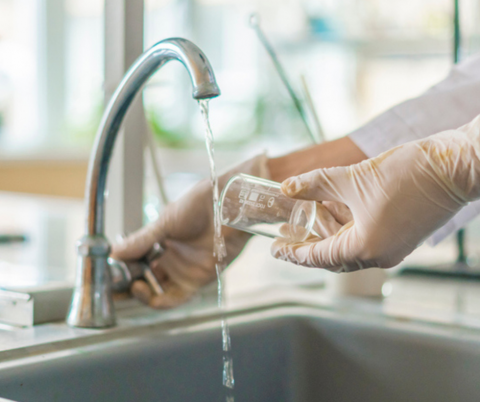If there is one question our sales team gets more than any other, it’s, “how do I know which filter to buy?” Sometimes that’s an easy answer. If you get your water from your local municipality, then your water is typically treated with chlorine or chloramines. For those on city water, there are many options. From our 600,000 Gallon & 1,000,000 Gallon Whole House Rhino, to our Countertop filter, to our Clean Water Machine, we’ve got you covered.
For those that use well water, the answer is a bit more complicated. If it’s not clear what kind of water you have based on your zip code, or by checking water reports for your area, we’ll send you a water test kit. The cost of the kit will be rebated back to you when you purchase your whole house system in an effort to make the entire process as efficient as possible.
Why it’s important to test your well water
First of all, if you know that your home uses well water, know that you’re in good company. Approximately 15 percent of the US population still uses private wells to source their water.
Approximately 15 percent of the US population still uses private wells to source their water.”
The key thing you need to know about private well water is that unlike tap water, private wells are not regulated by the Safe Drinking Water Act (SDWA) of 1994, as established by the Environmental Protection Agency (EPA). There are only recommendations around well water usage — primarily around how far they should be built from petroleum tanks, septic tanks, manure, livestock, etc.
That means that if a storm comes and floods your system or if the farm upstream from your home has a spill, all of those contaminants can get absorbed into the groundwater, and thusly into the water you drink every day.
What’s inside a typical water test kit?
Water test kits are easy-to-use solutions that help you find out exactly what’s in your water. As we mentioned, they’re particularly useful for those using well that don’t receive yearly water quality reports.
The neat part is that they’re like a mini science lab in a box. Here’s what is usually equipped in each package:
- four 60ml vials
- two 40ml vials
- 500ml tall plastic bottle
- 125ml glass bottle
- testing strips
- collection cups
- a gel ice pack to keep your water sample cold
- detailed instructions to help accurately complete the water collection process
How long does it take to get results back?
It depends on which lab you use. Some testing labs take 2 days to process your test results, some take 10-15 days, and some take up to 6 weeks.
As long as you’re diligent and take time with your research on the front-end, you won’t have to spend that time waiting for your results on the back end.
What do labs typically test for in water? 
Tests for city water users are there to help find the amounts of the most common contaminants that still remain in your water after treatment. This includes:
- chlorine
- heavy metals such as lead and mercury
- inorganic chemicals
- volatile organic compounds
For well water users, the tests help measure levels of the following:
- bacteria (such as coliform and e.Coli)
- heavy metals and minerals (such as lead, arsenic, and mercury)
- inorganic chemicals (such as nitrates and chloride)
- pH
- alkalinity
- hardness
Contaminants are no joke, and for those that rely on well water, it can mean anything from a day off work to a trip to the hospital if your water isn’t treated appropriately. Always make sure that you know what’s in your water, and invest in water filtration accordingly. At the end of the day, as long as you have the right filter for the job, then we’ve done our jobs.